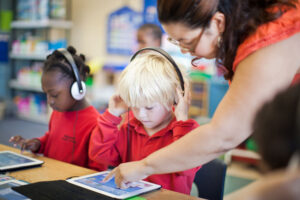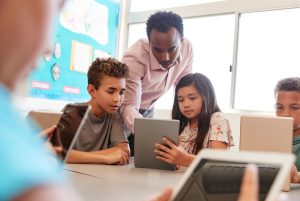
Transforming Learning Spaces for the Future of Education
Course Description
This course aims to equip educators with the skills to transform learning spaces to meet the educational needs of the future. Moving beyond traditional classroom setups, the course focuses on creating flexible learning environments that support students’ creativity, collaboration, digital skills, and critical thinking. Aligned with the 2021-2027 Erasmus+ Programme, the course highlights digital transformation and inclusivity priorities.
Participants will explore how to redesign both physical and digital learning environments to support individual and collective learning processes. The course focuses on redesigning learning spaces using digital tools, flexible furniture, and outdoor learning opportunities.
Course Methodology
The course follows an activity-based, hands-on, and collaborative methodology. While the theoretical component focuses on how to design learning spaces, participants will work on projects to transform physical and digital environments. Educators will develop strategies they can implement in their own schools through practical activities involving digital tools, mobile technologies, and learning space design.
Participants will also learn how to strengthen learning processes using digital technologies and see how these tools can be integrated into learning spaces.
Course Objectives
- Teach educators strategies for transforming learning spaces and applying these strategies in their own schools.
- Create flexible learning environments that encourage students’ creativity, collaboration, and individual learning.
- Design new learning spaces supported by digital tools and technologies.
- Develop methods for creating inclusive and environmentally friendly learning spaces.
Learning Outcomes
- Participants will be able to redesign physical and digital learning spaces to promote digital transformation in their classrooms.
- Participants will develop arrangements for flexible and creative learning environments.
- Participants will use digital tools and technologies to create effective learning spaces.
- Participants will design learning environments that support the implementation of Erasmus+ priorities in digital transformation and inclusivity within their schools.
Tentative Daily Programme
Day 1: The Importance and Design of Learning Spaces
- Icebreaker Activity: “Let’s Dream and Connect Together” – Participants will share their ideas about ideal learning spaces.
- Transforming Learning Spaces and Their Importance – How learning spaces can be transformed and the impact of this transformation on learning.
- Key Principles of Learning Space Design – Design principles for student-centered learning environments.
- Project Simulation: Designing Creative Learning Spaces – Participants will design new learning spaces that cater to student needs.
Day 2: Flexible Learning Spaces and Digital Transformation
- Warm-up Activity: “Learning in Flexible Spaces” – Participants will engage in a brief discussion on the characteristics of flexible learning spaces.
- Redesigning Learning Spaces with Flexible Furniture and Technology – How to make learning spaces more dynamic using flexible furniture and digital technologies.
- Enhancing Learning with Digital Tools and Technology – How to enrich the learning experience using digital tools and mobile technologies.
- Project Presentations and Feedback
Day 3: Combining Digital and Physical Learning Environments
- Warm-up Activity: “Integration of Digital and Physical Spaces” – Participants will discuss how to integrate digital and physical learning environments.
- Blended Learning Models and Technology Integration – Blended learning models and the use of digital technologies in classrooms.
- Combining Physical and Digital Learning Spaces – Working on how to enhance physical environments using digital tools.
- Project Presentations and Feedback
Day 4: Inclusive and Environmentally Friendly Learning Spaces
- Creating Environmentally Friendly Classrooms – Methods for creating sustainable learning spaces and eco-friendly practices.
- Designing Inclusive Learning Spaces – Discussing how to design learning spaces that support inclusive education.
- Group Project Presentations and Feedback
Day 5: Course Evaluation and Certification Ceremony
- Course Evaluation – Participants will reflect on their learning and discuss collaboration opportunities.
- Collaboration Opportunities for Future Learning Spaces – Participants will discuss collaboration opportunities for learning spaces projects aligned with Erasmus+.
- Certification Ceremony and Course Cake Cutting
- Cultural Excursion Support
At the End of the Course
- Participants will receive their certificates.
- Participants will provide a general evaluation of the course and complete the event survey.
- Participants will receive course materials, videos, photos, and PDF documents in both digital and print formats.
Follow-up and Support
After the course, participants will be provided with digital and printed materials. An email group will be created to facilitate ongoing collaboration and the sharing of ideas related to transforming learning spaces.
*Please note that course activities and content may vary depending on participants’ preferences and the instructor leading the session. Any changes to the course are at the discretion of the instructor. If there is a specific topic you would like to include in the course content, please let us know in advance.
Course Info
- Duration: 5 Days
- Location: All Location
- Cost: € 80-Day
- Certificate: Yes
- Prerequisites: No











